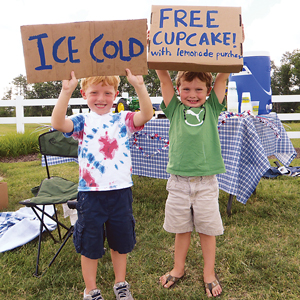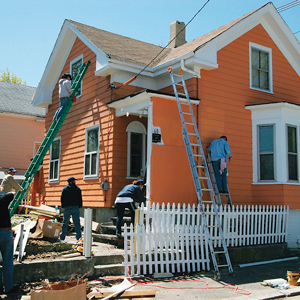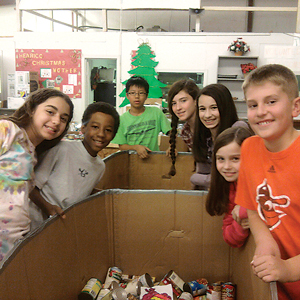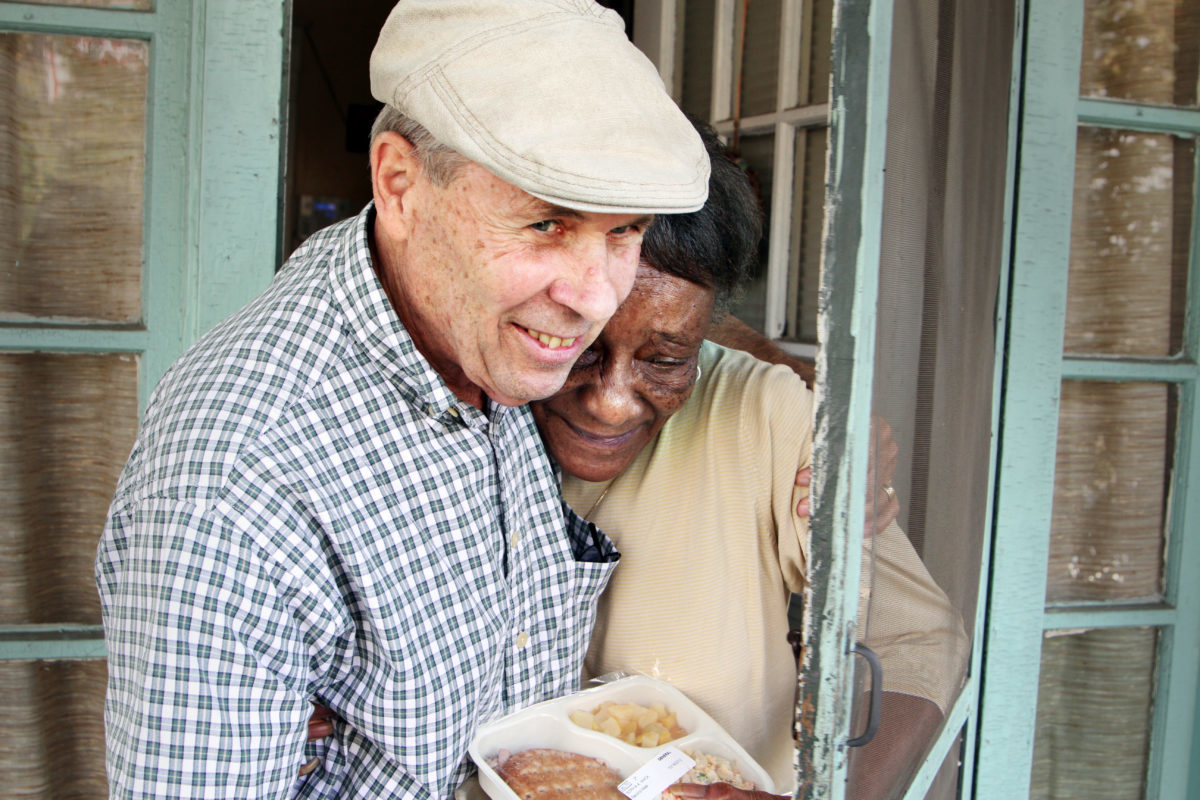Life isn’t fair.
Our parents told us that, and we, in turn, tell our children.
Resources aren’t distributed evenly; somebody always winds up in need, while others have more than they need. If you’re lucky enough to be in the latter group, it’s not just good policy but good parenting to encourage your children to adopt generosity as a character trait. A giving nature will not only make a better world but a better person.
Charity and volunteerism have become accepted ideals in America, the world’s leader in both excess and openhandedness. How do we instill the desire to help others into our children, make it part of their core beliefs and not simply a chore or a school requirement? How do we help children realize that with resources come the privilege and responsibility to share with those who have less?
And once you’ve convinced your kids of the value of service, how do you find volunteer opportunities?
Volunteering becomes a way of life when it’s woven into the family culture. In The Blessing of a Skinned Knee, Wendy Mogel, PhD, underscores parent example as the best way to influence a child’s values. If children don’t see parents practicing what they preach, chances are less that the selfless behavior will continue after graduation. The world will lose a helper, and your child will lose one path towards a kinder, enlightened way of life.
Volunteering is also a wonderful way for families to spend quality time together. Service opportunities for you and your kids abound. The goal is to provide a positive, sustainable experience that helps children understand their place in the world beyond personal wants and desires. When choosing a volunteer opportunity, consider your family’s interests, especially your children’s, as well as levels of abilities and the location, frequency, and duration of the commitment. Keep it age-appropriate and keep in mind the attention spans of young children.
Try linking a love of cooking to making food at a homeless shelter; a green thumb can create community gardens or beautification projects; an appreciation of small children becomes volunteering at childcare centers; an affinity for building backyard forts becomes a wonderful experience with real construction at Habitat for Humanity (which accepts volunteers as young as five!); musical talents become heartwarming entertainment for a nursing home. Something as fundamental as reading can be done in a sound studio at the Virginia Voice to benefit the visually impaired.
 If you’re looking for a classic volunteer opportunity for all ages, Anthem LemonAid, the Richmond-wide effort which encourages kids to sell lemonade to help children battling cancer, is a perennial family favorite.
If you’re looking for a classic volunteer opportunity for all ages, Anthem LemonAid, the Richmond-wide effort which encourages kids to sell lemonade to help children battling cancer, is a perennial family favorite.
And what kid doesn’t love animals? The Richmond SPCA provides a wonderful introduction to service, where kids age 7 and above can volunteer with a parent. This amazing facility can even provide a unique and memorable setting for family occasions, like birthday parties, that present a logical connection to a charity.
 Richmond mom of seven, Cal Jennison, recounts past birthdays held at our local animal shelter. “Instead of people presents, guests bring gifts for the animals.” Cal has made it a family tradition to celebrate birthdays in conjunction with a charity. “Our kids really enjoy choosing the organization they want to help in honor of their birthday.” Other Jennison birthday parties have included collecting household items for tsunami victims, books for underserved schools, and monetary donations for Comfort Zone Camp.
Richmond mom of seven, Cal Jennison, recounts past birthdays held at our local animal shelter. “Instead of people presents, guests bring gifts for the animals.” Cal has made it a family tradition to celebrate birthdays in conjunction with a charity. “Our kids really enjoy choosing the organization they want to help in honor of their birthday.” Other Jennison birthday parties have included collecting household items for tsunami victims, books for underserved schools, and monetary donations for Comfort Zone Camp.
While annual events – like birthdays – are wonderful portals to service, teaching children that we’re all responsible for helping one another year-round helps drive the point deeper and more permanently into a child’s world view. The concept of community is important to learn while young, and that we’re all part of many communities: schools, religious institutions, neighborhoods, cities, and ultimately, the planet.
Dr. Mogel writes about tikkunolam, Hebrew for repairing the world. “In Judaism everyone is supposed to think of themselves as having more than they need. Even the poorest person is obligated to find someone in greater need and share what he has with him. We have been given the gift of life in order to use it to make the world better.”
As our world becomes more globally connected, so has the outreach. Houses of worship are excellent resources for local service opportunities as well as foreign mission trips. International volunteerism has become so popular that travel companies like UnitedPlanted.org and CrossCulturalSolutions.org have cropped up to specialize in family volunteer vacations.
 Reverend Bill Wells has taken Richmond-area teens on numerous service trips, including to Guatamala, Dominican Republic, and the Tex-Mex border. He believes these are powerful events in the lives of everyone involved. “Sometimes you have to leave home to see it for the first time. When kids realize how a large part of the rest of the world lives, they can’t help but take less for granted and appreciate the stability of home.”
Reverend Bill Wells has taken Richmond-area teens on numerous service trips, including to Guatamala, Dominican Republic, and the Tex-Mex border. He believes these are powerful events in the lives of everyone involved. “Sometimes you have to leave home to see it for the first time. When kids realize how a large part of the rest of the world lives, they can’t help but take less for granted and appreciate the stability of home.”
Wells’ broad experience with international mission trips has shown him that kids are genuinely touched when they see the happiness and sense of community of people living in distressed parts of the world. “They learn to appreciate the resiliency of the human spirit and the importance of community in a way that America, with our commitment to individualism, just can’t teach.” While on the surface these trips may seem costly, “the difference they can make in the kids’ ability to think globally is priceless.”
And here at home? “Kids love seeing first-hand that they can make a meaningful impact,” explains Art Raymond, principal at Moody Middle School. “When you help out at a homeless shelter and feel that human connection, when it goes even deeper than just collecting food for the pantry, the issue becomes real.” Many schools make volunteering part of their curriculum. Raymond says Moody requires twenty hours of community service annually from its International Baccalaureate Students and encourages all students to participate in the service program. Even so, Raymond is quick to point out that his school does not refer to volunteer work as a requirement, but a commitment. “We ask our students to dedicate themselves to helping others.” Principal Raymond often quotes John F. Kennedy: To those whom much is given, much is expected.
As always, the Internet is a fountain of information for kid-centered volunteer ideas. Look at Kidscare.org, Compassionatekids.com, or KidsForCommunity.com. There are even national volunteer website databases, including VolunteerMatch.org. and Idealist.org.
There are ample opportunities locally and globally for us to join our kids in the joy and responsibility of helping others. But not every act of giving has to be organized. We can’t always drive our kids to the Richmond SPCA, work with them on a Habitat build, or afford to send them on service trips. Sometimes the simplest acts mean the most to both giver and receiver. Making dinner for a sick friend, mowing your elderly neighbor’s lawn, babysitting for the single mom down the street. Many opportunities to care for others present themselves each day, closer to home than we realize.
A family that lives a life full of both random and programmed acts of kindness will be a springboard to lifelong volunteering. As parents, we can help shape our children into good stewards of the world and generous neighbors to the less fortunate. Better still, we can model for them and share with them the blessings and the gifts of giving.




